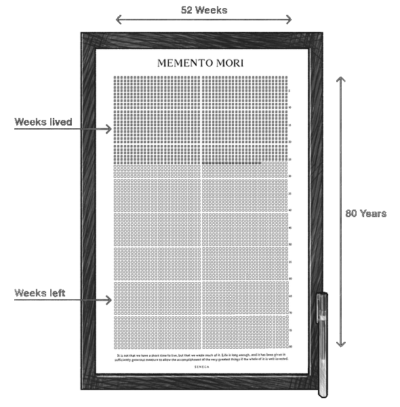Paradox of Time
20 November 2022

Hi, The Investor’s Podcast Network Community!
Hopefully you’re enjoying a relaxing Sunday, because we’re hitting your inbox to provide some light reading and perspective.
In the daily havoc of financial markets, it’s nice to take a step back sometimes.
Let’s dive into another weekend edition of We Study Markets, in just 4 minutes to read.
Enjoy ☕
Do you want to write for this newsletter? Apply here.
Understand the financial markets
in just a few minutes.
Get the daily email that makes understanding the financial markets
easy and enjoyable, for free.
QUOTE OF THE DAY

“The operational definition of resilience is how quickly you recover from being upset. And once you recover, you can think about it more clearly.
There’s an intimate relationship between our executive centers, the part of our brain that thinks about what to do and makes good decisions, and the emotional centers, which can overwhelm and hijack it.
And so being able to recover from that hijack state, I think is absolutely crucial to anybody, particularly to an investor.”
BROUGHT TO YOU BY
Do you have the right insurance for your rental property?
Get a free quote in minutes to find out how Steadily can save you time and money on your landlord insurance.
Get a quote online today at Steadily.com
THE MAIN STORY: THE PARADOX OF TIME
Overview
How much, exactly, is your time worth?
Would you, for example, swap lives with Warren Buffett, who has a net worth of over $100 billion?
Probably not, right?
At least, I wouldn’t. Why? Because he’s 92 years old!
For most, not even the temptation of billions of dollars is enough to sacrifice (hopefully) their decades worth of time left on this earth.
Despite being aware of our incredibly precious time, we frequently make choices that disrespect its value. ‘Doom scrolling’ on social media for hours is a great example.
Or even when we visit somewhere beautiful and fixate on getting the right picture rather than just enjoying the moment.
What to know
This is what Sahil Bloom calls the “Paradox of time.”
Bloom is a former Stanford baseball player, managing partner of SRB Ventures, prominent Twitter personality, and writer of The Curiosity Chronicle newsletter.
He’s an interesting guy. Let’s go through his thinking here.

Bloom explains that in Latin, there’s a phrase called Memento Mori, which means to “remember that you must die.”
It’s rooted deeply in stoic philosophy, and instead of being morbid, it’s intended to illuminate and inspire.
The backstory
He adds that the phrase is thought to have come from the Roman Empire in response to military heroes returning from successful conquests that may begin to feel “immortal” amidst the celebrations.
During the victory parades, it was actually someone’s job to ride in the chariot alongside the heroes and whisper “memento mori” in their ears.
The hope was that it would humble the men and shield them from the harmful effects of an unchecked ego.
Big picture
In the present day, the phrase has a cult following of sorts, and you can even buy calendars that track your life’s progression.
It’s not for everybody, but it serves as a constant reminder to prioritize and value your time. Bloom says, “we must stop hiding from the passage of time — we must instead start embracing it.”

By his estimates, the average career is about 80,000 working hours long. In other words, for every five waking hours of not working during our lives, one is devoted to our careers.
Bloom argues that “work is important enough to take seriously, but not important enough to take too seriously.” Yet, many of us will spend years working “too seriously.”
In other words, in our quest for more “money, success, fame, whatever, we may find ourselves winning the battle but losing the war.”
Putting it in numbers
When you quantify the expected number of hours left in your career or your life, the number of times you’ll see your parents again, how many more chances you’ll have to drop off your child at school, or even just how many more bites you’ll eat of your favorite meal, you gain a sharp perspective on reality that’s often lost in the day-to-day chaos that is modern living.
Bloom concludes that, unfortunately, the answer to all those calculations is probably much lower than you think, given our inclination to believe that our lives will carry on as they do now indefinitely.

Takeaways
Life is impermanent, but that makes it valuable and worth navigating.
He urges us to do the simple math by estimating how much time is left in our lives and then have the conversations that these questions inspire.
After that, compile a list of things you’ll never regret doing and set it somewhere you’ll see it every day.
Perhaps this includes going for a long walk and journaling, having lunch with a friend, re-reading a favorite book, calling a loved one, learning a new hobby, or planning that bucket list trip abroad.
We should do as many of these things as we can daily.
And I agree with him. This has been a challenging topic to write about just because it’s so relevant. I certainly fail to meaningfully reconcile with time’s fleeting nature, and I suspect I’m not alone in that.
Go deeper
You can read the full write-up here, and for more Sahil Bloom, check out Preston Pysh’s interview with him on the Cantillon Effect.
We’ll be back in your inbox tomorrow to talk more about markets!
SEE YOU NEXT TIME!

That’s it for today on We Study Markets!
See you later!
If you enjoyed the newsletter, keep an eye on your inbox for them on weekdays around 6pm EST, and if you have any feedback or topics you’d like us to discuss, simply respond to this email.











